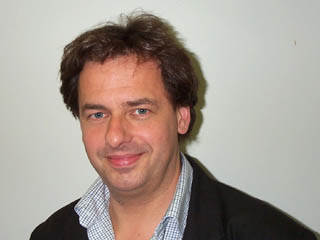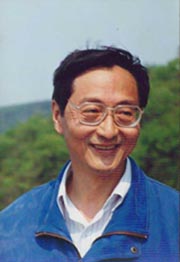|
Home Call for Papers Paper Submission Accepted Papers Proceedings Program Invited Speakers People Involved Registration Location Accommodation Visa Info Tourist Info Links Sponsors Contact |
Invited SpeakersProbabilistic Dynamic Belief RevisionAlexandru Baltag, Oxford University, UK.  ABSTRACT: This talk is based on joint work with Sonja Smets. I investigate the relation between probabilistic and qualitative (relational) models for belief revision, and between the corresponding updates. I use the Popper-Renyi theory of conditional probability, introducing discrete conditional probabilistic models for (conditional) belief, and comparing them with the more standard plausibility models. I also consider a related notion, that of "safe belief", which is a weak (non-negatively introspective) type of "knowledge". I present a probabilistic version of this concept ("degree of safety") and analyze its role in games. I develop a theory of probabilistic dynamic belief revision, introducing probabilistic action models for doxastic events (such as various forms of learning and communication) and a notion of probabilistic update product, which incorporates a belief revision mechanism. I finish with the reduction laws that completely axiomatize the qualitative logic of doxastic events, and with some open problems concerning the corresponding probabilistic logic. BIOGRAPHY: Meaningful Talk Yossi Feinberg, Stanford University, US.  ABSTRACT: Recent developments in the interface of Economics and Logic yield the promise of capturing phenomena in strategic interaction that was previously beyond theoretical economic modelling. We consider one such application in the case of strategic situations that players may perceive differently. We show that the content of messages sent in this setting carries strategic implications without resorting to prior conventions and beyond the observations made in the literature dealing with cheap talk communications. The content of the message becomes strategically meaningful since it reveals perceptions. Various forms of interaction between meaningful statements and strategic behavior are discussed. BIOGRAPHY: Yossi Feinberg is an associate professor of economics at the Graduate School of Business at Stanford University. He received his PhD in Mathematics from the Hebrew University in Jerusalem in 1997 under the supervision of Nobel Laureate Robert Aumann. Yossi works mainly in the field of foundations of economic theory. His recent work includes the introduction of games with unawareness and analysis of strategic decision making in the face of unawareness, other recent work concerns with the testing of stochastic predictions in a non-Bayesian, non-parametric, setting. Yossi is an associate editor of the Journal of Economic Theory. Active Epistemics: Methods, Recommendations and Hypotheses to Learn Vincent F. Hendricks, Roskilde University, Denmark.  ABSTRACT: The talk initially surveys the landscape for active agents in their epistemic environments and the motivating factors from philosophy, computer science and social software. Modal operator theory is then briefly reviewed as a multi-modal framework in which active agents may be modeled and studied. Finally the intersection between agency, learnability and temporally fluctuating hypotheses is scrutinized from an epistemological perspective. BIOGRAPHY: Vincent F. Hendricks is Professor of Formal Philosophy at Roskilde University in Denmark and member of IIP, the Institut Internationale de Philosophie. His work concentrates primarily on bringing mainstream and formal approaches to epistemology together through modal operator theory. Modal operator theory is the cocktail obtained by mixing alethic, tense and epistemic logic with elements from formal learning theory in order to study the limiting validity of convergent knowledge. This paradigm has been articulated in a number papers and books notably The Convergence of Scientific Knowledge (Springer 2001) and Mainstream and Formal Epistemology (Cambrdige University Press 2006). Vincent F. Hendricks is editor-in-chief of Synthese, Synthese Library and founder of OLOG - The Network for Philosophical Logic and Its Applications [1] and chief editor of ONEWS - The Newsletter for Philosophical Logic and Its Applications. Extended Modal Logics for Social Software (joint work with Thomas Agotnes and Michael Wooldridge) Weibe van der Hoek, Liverpool University, UK.  ABSTRACT: As two case studies in utilising modal logic for social software, we present two modal logics, the first being Modal Coalition Game Logic, in which we can reason about coalitional games, in the sense of cooperative game theory. Other than for instance Pauly's Coalition Logic, we can directly refer to agents' preferences. Moreover, we interpret our language directly on coalitional games as defined in Osborne and Rubinstein. In this logic, we can express notions like the core and imputations. Our second logic is designed to reason about Judgment and Preference aggregation. In particular, we present an axiomatisation in which Arrows' theorem is derivable. We will demonstrate that from a modal logic point of view, completeness of both logics can be obtained by adding some 'extended modal power' to the language: in the case of Coalition Games, we add nominals for agenda-items to the language, and in the case of the Social Welfare Logic, the modal D-operator comes to the rescue. BIOGRAPHY: Wiebe van der Hoek is currently head of the Agent ART Group (University of Liverpool) whose research in agents concentrates on Logics for Agent Systems, Cooperation, Argumentation, and Games. He is a Fellow of the British Computer Society and a College Member of the EPSRC. He has been organizer of the European Agent Systems Summer School (EASSS), the Conference on Logics for Games and Decision Theory (LOFT), and the Conference on Logics for AI (JELIA), and he is Editor-in-Chief of Knowledge, Rationality and Action and Managing Editor of a new bookseries Texts in Logic and Games. Some Thoughts on Chinese Mohist Logic Jialong Zhang, Yanshan University and Chinese Academy of Social Sciences, China.  ABSTRACT: Aristotle's logic, especially the well-known `Syllogistic', is often considered the first systematic formalization of basic logical issues. The Stoic school then made a further contribution through the development of propositional logic. This tradition of formalism has had an unparalleled impact on the history of Western thought, and it has led to the flowering of both traditional and modern logic in the West. This talk, however, turns East, on a long journey back to Ancient China, and attempts to seek answers to the following questions. Have the Chinese ever developed any logic similar to Aristotle or the Stoics? What sorts of reasoning were they using? What are the similarities and differences between the Chinese tradition and the Western one? What new understanding can we achieve by re-interpreting old Chinese texts The Mohist Canons with our modern logical theories? BIOGRAPHY: Jialong Zhang is currently Professor of Logic at Yanshan University, and Emeritus Professor at Chinese Academy of Social Sciences. His main research area is the history of Western logic and he has published many works on this topic, notably, The Development of Mathematical Logic (Social Sciences Academic Press of China, 1993) and Modal Logic and Philosophy (Chinese Society Publishing House, 2003). In addition, he maintains active interests in Chinese Ancient Logic, and he advocates reading Chinese old texts by means of modern logical theories. Many of his recent contributions are included in the book History of Logical Thought (Hunan Education Publishing House, 2004). Jialong Zhang is the current President of the Chinese Association of Logic.
|
| last modified on Sunday, 25-July-2007 16:31:40 CEST (Fenrong) |


